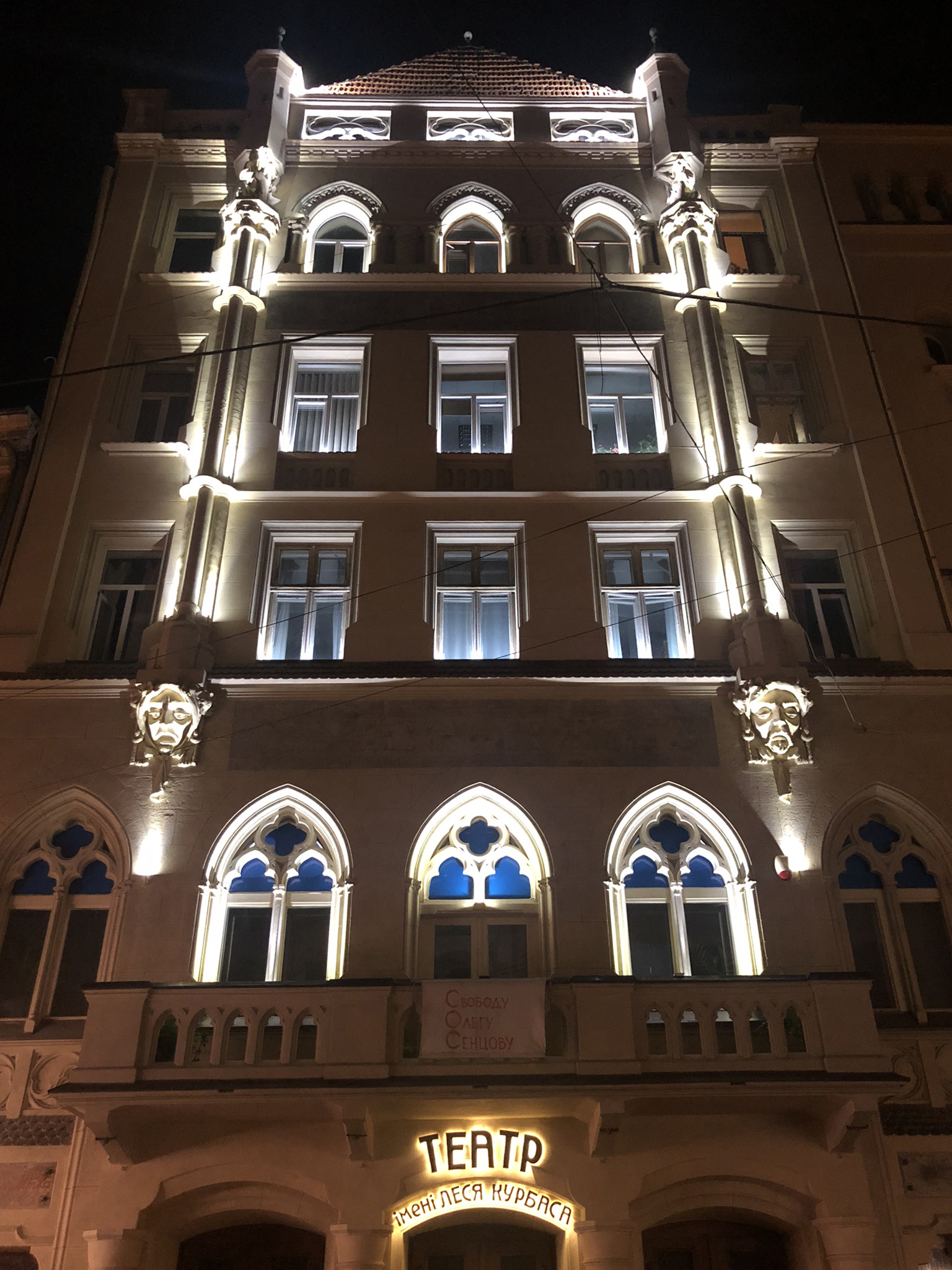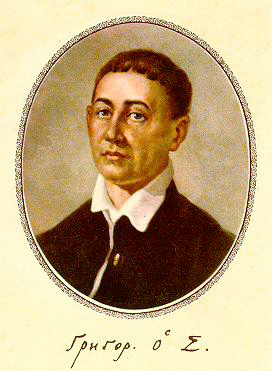|
Les Kurbas Theatre
The Les Kurbas Lviv Academic Theater was founded in 1988 by Volodymyr Kuchynsky and a group of young actors who, like the outstanding Ukrainian director Les Kurbas and his colleagues in 1918, felt the need to create a theater. Oleg Mikhailovich Tsyona has been the artistic director of the theater since 2019. Since its founding, the Les Kurbas Theater has grown into one of the most famous theater groups, both in Ukraine and abroad. Performances at the theater including: "Garden of Unthawed Sculptures" by Lina Kostenko; "Grateful Herod" and "Narcissus" by Hryhoriy Skovoroda; "Between Two Forces" by Volodymyr Vynnychenko; "In the Field of Blood," "Johanna, Herod's Wife," and "Apocrypha" by Lesia Ukrainka; "Dreams" and "Zabavy dlya Fausta" by Fyodor Dostoevsky; "Praise to Eros" and "Silenus Alcibiadis" by Plato; "Marco the Cursed or Oriental Legend" by Vasyl Stus; and " Waiting for Godot" by Samuel Beckett Samuel Barclay Beckett (; 13 April 1906 – 22 December 1989) was a ... [...More Info...] [...Related Items...] OR: [Wikipedia] [Google] [Baidu] |
Kurbas Theatre Lviv
Oleksandr-Zenon Stepanovych Kurbas ( ua , Олександр-Зенон Степанович Курбас; 24 February 1887– 30 November 1937), was a Ukrainians, Ukrainian movie and theater director. He is considered by many to be the most important Ukrainian theater director of the 20th century. He formed, together with Vsevolod Meyerhold, Yevgeny Vakhtangov and several other directors, the Soviet theater avant-garde in the 1920s and 1930s. He is one of the most prominent representatives of Ukrainian avant-garde art. He is considered to be one of the lead figures of the Executed Renaissance. Early work Kurbas was born in Sambir (then part of Austria-Hungary) on February 25, 1887 and was given a double name Oleksandr-Zenon, for short Les or Oles. His father, Stepan Pylypovych Kurbas (Yanovych) (1862–1908), was a Ruthenians, Ruthenian actor who descended from Lithuanian people, Lithuanian lineage. His mother, Vanda Adolfivna (nata Kulczycka), born in Stary Skalat, was also an ... [...More Info...] [...Related Items...] OR: [Wikipedia] [Google] [Baidu] |
Fyodor Dostoevsky
Fyodor Mikhailovich Dostoevsky (, ; rus, Фёдор Михайлович Достоевский, Fyódor Mikháylovich Dostoyévskiy, p=ˈfʲɵdər mʲɪˈxajləvʲɪdʑ dəstɐˈjefskʲɪj, a=ru-Dostoevsky.ogg, links=yes; 11 November 18219 February 1881), sometimes transliterated as Dostoyevsky, was a Russian novelist, short story writer, essayist and journalist. Dostoevsky's literary works explore the human condition in the troubled political, social, and spiritual atmospheres of 19th-century Russia, and engage with a variety of philosophical and religious themes. His most acclaimed novels include ''Crime and Punishment'' (1866), ''The Idiot'' (1869), ''Demons'' (1872), and ''The Brothers Karamazov'' (1880). His 1864 novella, ''Notes from Underground'', is considered to be one of the first works of existentialist literature. Numerous literary critics regard him as one of the greatest novelists in all of world literature, as many of his works are considered highly influen ... [...More Info...] [...Related Items...] OR: [Wikipedia] [Google] [Baidu] |
Theatres Completed In 1988
Theatre or theater is a collaborative form of performing art that uses live performers, usually actors or actresses, to present the experience of a real or imagined event before a live audience in a specific place, often a stage. The performers may communicate this experience to the audience through combinations of gesture, speech, song, music, and dance. Elements of art, such as painted scenery and stagecraft such as lighting are used to enhance the physicality, presence and immediacy of the experience. The specific place of the performance is also named by the word "theatre" as derived from the Ancient Greek θέατρον (théatron, "a place for viewing"), itself from θεάομαι (theáomai, "to see", "to watch", "to observe"). Modern Western theatre comes, in large measure, from the theatre of ancient Greece, from which it borrows technical terminology, classification into genres, and many of its themes, stock characters, and plot elements. Theatre artist Patrice ... [...More Info...] [...Related Items...] OR: [Wikipedia] [Google] [Baidu] |
Theatres In Lviv
Theatre or theater is a collaborative form of performing art that uses live performers, usually actors or actresses, to present the experience of a real or imagined event before a live audience in a specific place, often a stage. The performers may communicate this experience to the audience through combinations of gesture, speech, song, music, and dance. Elements of art, such as painted scenery and stagecraft such as lighting are used to enhance the physicality, presence and immediacy of the experience. The specific place of the performance is also named by the word "theatre" as derived from the Ancient Greek θέατρον (théatron, "a place for viewing"), itself from θεάομαι (theáomai, "to see", "to watch", "to observe"). Modern Western theatre comes, in large measure, from the theatre of ancient Greece, from which it borrows technical terminology, classification into genres, and many of its themes, stock characters, and plot elements. Theatre artist Patrice ... [...More Info...] [...Related Items...] OR: [Wikipedia] [Google] [Baidu] |
Samuel Beckett
Samuel Barclay Beckett (; 13 April 1906 – 22 December 1989) was an Irish novelist, dramatist, short story writer, theatre director, poet, and literary translator. His literary and theatrical work features bleak, impersonal and tragicomic experiences of life, often coupled with black comedy and nonsense. It became increasingly minimalist as his career progressed, involving more aesthetic and linguistic experimentation, with techniques of repetition and self-reference. He is considered one of the last modernist writers, and one of the key figures in what Martin Esslin called the Theatre of the Absurd. A resident of Paris for most of his adult life, Beckett wrote in both French and English. During the Second World War, Beckett was a member of the French Resistance group Gloria SMH (Réseau Gloria). Beckett was awarded the 1969 Nobel Prize in Literature "for his writing, which—in new forms for the novel and drama—in the destitution of modern man acquires its elevation". He ... [...More Info...] [...Related Items...] OR: [Wikipedia] [Google] [Baidu] |
Vasyl Stus
Vasyl Semenovych Stus ( uk, Васи́ль Семе́нович Стус; 6 January 1938, Rakhnivka, Ukrainian SSR – 4 September 1985, Perm-36, Kuchino, Russian SFSR) was a Ukrainian poet, translator, literary critic, journalist, and an active member of the Ukrainian dissident movement. For his political convictions, his works were banned by the Soviet regime and he spent 13 years in detention until his death in Perm-36—then a Soviet forced labor camp for political prisoners, subsequently The Museum of the History of Political Repression—after having declared a hunger strike on September 4, 1985. On November 26, 2005, the Ukrainian president Viktor Yushchenko posthumously awarded him the highest national title: Hero of Ukraine. Stus is widely regarded as one of Ukraine's foremost poets. Biography Vasyl Stus was born on January 6, 1938, into a peasant family in the village of Rakhnivka, Haisyn Raion, Vinnytsia Oblast (modern Ukraine) (province), Ukrainian SSR. The following ... [...More Info...] [...Related Items...] OR: [Wikipedia] [Google] [Baidu] |
Plato
Plato ( ; grc-gre, Πλάτων ; 428/427 or 424/423 – 348/347 BC) was a Greek philosopher born in Athens during the Classical period in Ancient Greece. He founded the Platonist school of thought and the Academy, the first institution of higher learning on the European continent. Along with his teacher, Socrates, and his student, Aristotle, Plato is a central figure in the history of Ancient Greek philosophy and the Western and Middle Eastern philosophies descended from it. He has also shaped religion and spirituality. The so-called neoplatonism of his interpreter Plotinus greatly influenced both Christianity (through Church Fathers such as Augustine) and Islamic philosophy (through e.g. Al-Farabi). In modern times, Friedrich Nietzsche diagnosed Western culture as growing in the shadow of Plato (famously calling Christianity "Platonism for the masses"), while Alfred North Whitehead famously said: "the safest general characterization of the European philosophical tra ... [...More Info...] [...Related Items...] OR: [Wikipedia] [Google] [Baidu] |
Lesia Ukrainka
Lesya Ukrainka ( uk, Леся Українка ; born Larysa Petrivna Kosach, uk, Лариса Петрівна Косач; – ) was one of Ukrainian literature's foremost writers, best known for her poems and plays. She was also an active political, civil, and feminist activist. Among her best-known works are the collections of poems ''On the wings of songs'' (1893), ''Thoughts and Dreams'' (1899), ''Echos'' (1902), the epic poem ''Ancient fairy tale'' (1893), ''One word'' (1903), plays ''Princess'' (1913), ''Cassandra'' (1903—1907), ''In the Catacombs'' (1905), and ''Forest Song'' (1911). Biography Lesya Ukrainka was born in 1871 in the town of Novohrad-Volynskyi (now Zviahel) of Ukraine. She was the second child of Ukrainian writer and publisher Olha Drahomanova-Kosach, better known under her literary pseudonym Olena Pchilka. Ukrainka's father was Petro Kosach (from the Kosača noble family), head of the district assembly of conciliators, who came from the northe ... [...More Info...] [...Related Items...] OR: [Wikipedia] [Google] [Baidu] |
Volodymyr Vynnychenko
Volodymyr Kyrylovych Vynnychenko ( ua, Володимир Кирилович Винниченко, – March 6, 1951) was a Ukrainian statesman, political activist, writer, playwright, artist, who served as the first Prime Minister of Ukraine.100 years ago the Central Rada formed the first government of Ukraine (infographics) ''100 років тому Центральна Рада створила перший уряд України (інфографіка)'' (28 ... [...More Info...] [...Related Items...] OR: [Wikipedia] [Google] [Baidu] |
Hryhoriy Skovoroda
Hryhorii Skovoroda, also Gregory Skovoroda or Grigory Skovoroda ( la, Gregorius Scovoroda; uk, Григорій Савич Сковорода, ''Hryhorii Savych Skovoroda''; russian: Григо́рий Са́ввич Сковорода́, ''Grigory Savvich Skovoroda''; 3 December 1722 – 9 November 1794) was a philosopher of Ukrainian Cossack origin who lived and worked in the Russian Empire. He was a poet, a teacher and a composer of liturgical music. His significant influence on his contemporaries and succeeding generations and his way of life were universally regarded as Socratic, and he was often called a "Socrates". Skovoroda's work contributed to the cultural heritage both of modern-day Ukraine and of Russia. Skovoroda wrote his texts in a mixture of three languages: Church Slavic, Ukrainian, and Russian, with a large number of Western-Europeanisms, and quotations in Latin and Greek. Most of his surviving letters were written in Latin or Greek, but a small frac ... [...More Info...] [...Related Items...] OR: [Wikipedia] [Google] [Baidu] |










